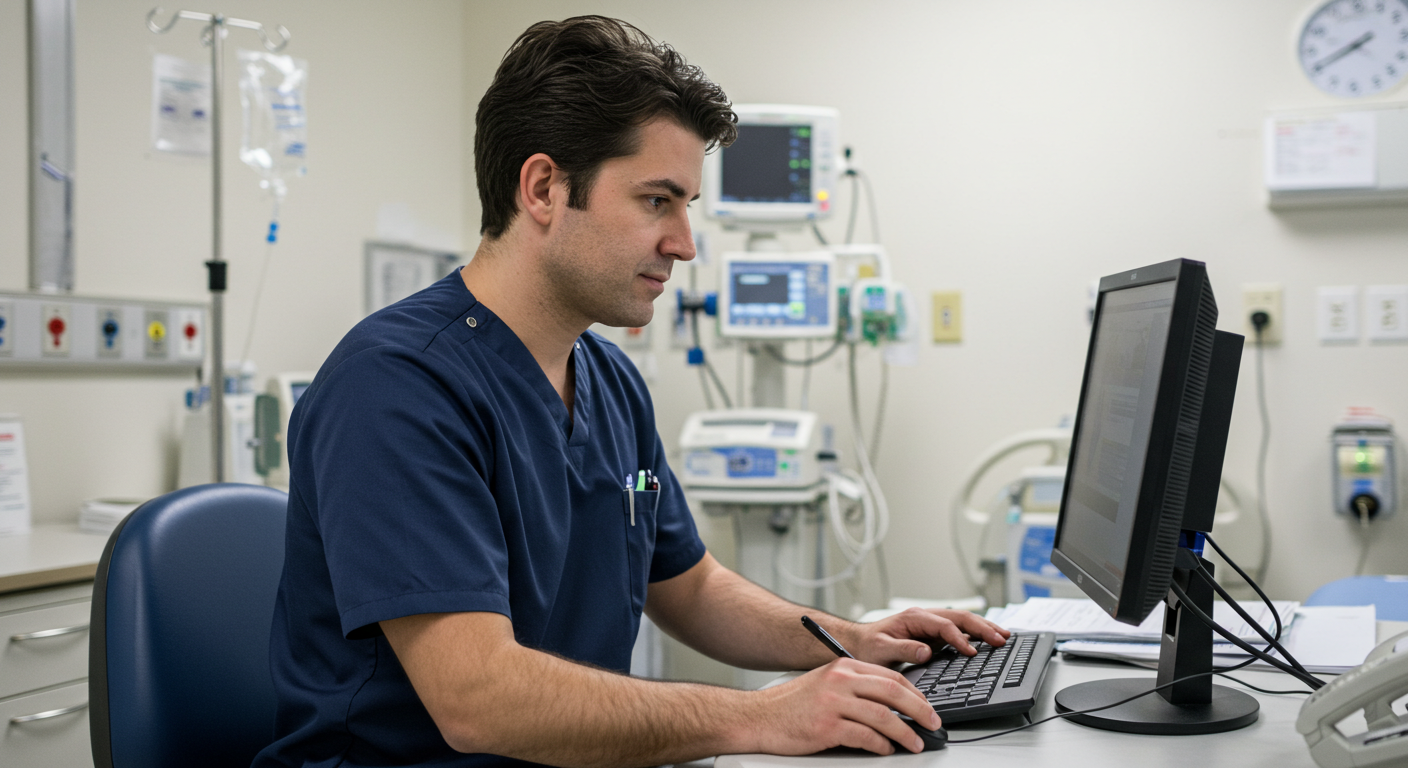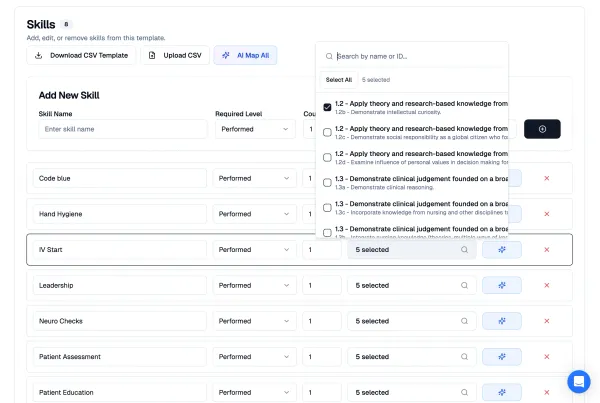The Ultimate Survival Guide to Nursing Clinical Rotations
Clinical rotations are a transformative phase in your nursing education. While they come with challenges, they’re also an opportunity to grow, explore your passions, and develop the skills you’ll need to excel in your career.

Clinical rotations are one of the most pivotal experiences in a nursing student’s journey. They bridge the gap between theory and practice, allowing you to step out of the classroom and into real-world healthcare settings. However, this transition can feel overwhelming without the right preparation and mindset.
At NurseTasks, we understand the challenges and opportunities clinical rotations bring. That’s why we’ve compiled this comprehensive guide to help you navigate this critical phase of your nursing education successfully.
Understanding Clinical Rotations

What Are Clinical Rotations?
Clinical rotations are a cornerstone of your nursing education, where you step out of the classroom and into real-world healthcare settings. They’re designed to immerse you in patient care, giving you the opportunity to apply the theories and concepts you’ve been studying. During these rotations, you’ll work under the supervision of experienced preceptors, nurses, and clinical instructors, learning everything from performing basic skills to managing complex patient cases.
Rotations are divided into specialties such as med-surg, pediatrics, OB/GYN, mental health, and critical care. Each rotation serves a dual purpose: to broaden your understanding of nursing roles and help you discover the areas where you feel most passionate and confident. For me, med-surg provided an excellent foundation, while my OB/GYN rotation gave me a newfound appreciation for the intimate moments nurses share with patients.
Why Clinical Rotations Are Crucial
The value of clinical rotations goes beyond skill acquisition. They shape your ability to:
- Think Critically: Nursing isn’t just about following steps; it’s about assessing situations, identifying problems, and finding solutions.
- Build Professional Relationships: You’ll develop a sense of teamwork and learn how to collaborate with a multidisciplinary healthcare team.
- Transition to Practice: Rotations give you a glimpse of what it’s like to be a nurse, helping you prepare for the challenges of a full-time role after graduation.
This process takes time, but be persistent and it will eventually click.
The Role of a Nursing Student
Your role in clinical rotations is to observe, assist, and learn. Preceptors and staff don’t expect you to know everything, but they do expect you to be prepared and proactive.
Here’s what being prepared looks like:
- Know Your Basics: Review key concepts like anatomy, pharmacology, and common nursing procedures before each shift.
- Be Professional: Dress appropriately, be punctual, and maintain a positive attitude. First impressions matter!
- Ask Questions: Curiosity is a strength. Whether it’s about a diagnosis, a medication, or a patient interaction, asking questions shows your commitment to learning.
Building Rapport with Preceptors and Staff
Your preceptor is your mentor during clinical rotations. They’ll guide you, challenge you, and sometimes push you out of your comfort zone. Building a good relationship with them is essential.
- Show Initiative: Volunteer to help with tasks, even small ones like fetching supplies or repositioning a patient.
- Be Receptive to Feedback: Constructive criticism is a gift. Use it to refine your skills and grow.
- Express Gratitude: A simple “thank you” goes a long way in building rapport and showing respect for their time and effort.
Setting Yourself Up for Success
Start each rotation with clear goals. What do you want to achieve? Maybe it’s mastering a specific skill, gaining confidence in patient interactions, or simply learning how to manage your time effectively. Write these goals down and revisit them regularly to track your progress.
Remember, clinical rotations are as much about self-discovery as they are about skill-building. Be open to the experiences, embrace the challenges, and celebrate your wins—big or small.
Preparing for Your First Day

Essential Gear and Supplies
Preparation starts with the basics, and having the right tools is non-negotiable. These essentials will not only make your day run smoother but also set a professional tone.
- Uniform and Shoes: Your uniform should be clean, wrinkle-free, and comfortable enough for long shifts. Invest in high-quality, supportive shoes because you’ll be on your feet for hours. Trust me, your back and knees will thank you later!
- Stethoscope: Choose a reliable stethoscope. While budget-friendly options work, a mid-range model can offer better sound quality and durability.
- Pens, Highlighters, and Notebooks: Always have a pen handy. It sounds simple, but you’ll use it more than you expect—for jotting down vital signs, patient notes, or tasks. A small notebook or pocket planner is also great for recording important information.
- Clinical Apps: Check out apps like NurseTasks that help you stay organized and on track during your clinical rotations with notifications and reminders for patient care tasks.
Mindset and Professionalism
Your first day is about making a strong impression—not just on your preceptor but on the entire team. Here’s how you can show you’re ready to be part of the healthcare environment:
- Be Early: Aim to arrive at least 15 minutes before your shift starts. Use this time to familiarize yourself with the unit and get settled.
- Come Prepared: Review any material provided by your school or clinical site beforehand, such as unit policies or patient safety protocols.
- Adopt a Positive Attitude: Even if you’re nervous, focus on being approachable and eager to learn. Remember, every nurse and preceptor started where you are now.
Setting Expectations
Before starting your rotations, take time to understand your school’s requirements and the expectations of your preceptor.
- Ask Questions Upfront: During your orientation, ask about the unit workflow, what your preceptor expects from you, and how they prefer to provide feedback.
- Clarify Your Scope of Practice: Know what you’re allowed to do as a student and when you’ll need supervision.
This proactive approach shows professionalism and helps avoid misunderstandings later.
Self-Care Before the Big Day
Starting clinical rotations is exciting but can also be physically and emotionally draining. Here’s how to prepare yourself:
- Get a Good Night’s Sleep: Sleep is essential for staying sharp and focused during your shift.
- Eat Well: Start your day with a nutritious meal to keep your energy levels steady. I found that protein-rich breakfasts, like eggs or yogurt, kept me feeling fuller longer.
- Pack Smart: Bring snacks, a water bottle, and any required textbooks or reference materials. Staying hydrated and fueled can make a long day much easier.
Mental Preparation
It’s normal to feel a mix of excitement and apprehension before your first day. To manage those jitters:
- Visualize Success: Picture yourself confidently interacting with patients and completing tasks.
- Stay Flexible: Not everything will go as planned, and that’s okay. Be ready to adapt and learn from the unexpected.
- Focus on Growth: Remember, you’re not expected to know everything. Your job is to observe, ask questions, and improve with each shift.
By preparing thoroughly and approaching your first day with the right mindset, you’ll set the stage for a productive and rewarding clinical experience.
Making the Most of Your Rotations

Active Learning Strategies
Clinical rotations are your opportunity to bridge the gap between theory and practice. You’ll learn a lot just by being present, but taking a proactive approach will make your experience even more rewarding.
- Ask Questions: Every moment is a chance to learn. Whether it’s about a patient’s condition, a treatment plan, or a nursing task, don’t hesitate to ask. For example, during my med-surg rotation, you can ask why a patient with heart failure is receiving a specific diuretic to deepen your understanding of medication management.
- Engage in Tasks: Offer to perform skills you’ve practiced in class. This could include taking vital signs, administering medications (if permitted), or assisting with wound care. Hands-on experience builds confidence and muscle memory.
- Reflect Daily: After each shift, take a few minutes to jot down what you learned, what you found challenging, and how you can improve. Reflection helps solidify knowledge and track growth.
Building Rapport with Patients
Interacting with patients is one of the most rewarding aspects of nursing, but it can also feel intimidating at first.
- Start with Empathy: Patients may be scared, frustrated, or in pain. A simple “How are you feeling today?” can go a long way.
- Be Clear and Calm: Explain what you’re doing and why, even for small tasks like checking blood pressure. This builds trust and helps patients feel involved in their care.
- Respect Their Privacy and Dignity: Always follow proper protocols for confidentiality and consent.
Time Management Tips
One of the biggest challenges for nursing students is balancing patient care, learning opportunities, and documentation. Here’s what worked for me:
- Prioritize Tasks: At the start of your shift, review patient assignments and make a plan. Focus on time-sensitive tasks like medication administration first.
- Break Down Your Day: Divide your shift into manageable chunks. For example, aim to complete morning assessments by a certain time.
- Use Tools Wisely: Leverage apps or worksheets to keep track of tasks and deadlines. Tools like NurseTasks can help you stay organized and monitor your progress efficiently.
Overcoming the Fear of Mistakes
Mistakes are a natural part of learning, and clinical rotations are no exception. The key is to approach them as opportunities for growth.
- Own Up Quickly: If you make an error or are unsure about something, inform your preceptor immediately.
- Analyze and Learn: Ask yourself what led to the mistake and how you can prevent it in the future.
- Don’t Dwell: Everyone—from new students to seasoned nurses—has made errors. What matters is how you move forward.
Maximizing Your Relationship with Preceptors
Your preceptor is there to guide you, but the relationship works best when it’s collaborative.
- Be Honest About Your Goals: Let them know what skills you want to focus on.
- Communicate Regularly: Check in at the start and end of each shift to review expectations and progress.
- Show Gratitude: A sincere “thank you” can strengthen your rapport and make your preceptor feel appreciated.
Celebrating Small Wins
Progress often comes in small steps. Maybe you finally inserted an IV successfully or managed your time better than the previous day. Recognize these achievements—they’re proof that you’re growing into the nurse you’re meant to be.
Communication and Teamwork

The Importance of Communication in Nursing
Clear, effective communication is a cornerstone of nursing. During clinical rotations, you’ll communicate with patients, families, nurses, doctors, and other members of the healthcare team. How you convey information can directly impact patient outcomes and your ability to function within a team.
Communication isn’t just about what you say—it’s about how you listen, interpret, and respond. Active listening and concise, respectful communication go a long way in establishing trust and ensuring clarity.
Communicating with Patients
Patients may feel vulnerable, confused, or scared. Your ability to connect with them can significantly impact their experience and recovery.
- Be Approachable: Smile, introduce yourself, and explain your role. A warm greeting can ease tension and set a positive tone.
- Use Layman’s Terms: Avoid medical jargon when speaking with patients and their families. Break down complex information into simpler terms.
- Ask Open-Ended Questions: Instead of “Are you feeling better?” try “How are you feeling today?” Open-ended questions invite more detailed responses.
- Be Honest but Reassuring: If you don’t know the answer to a patient’s question, it’s okay to say, “I’m not sure, but I’ll find out for you.” Honesty builds trust.
Collaborating with the Healthcare Team
Teamwork is at the heart of healthcare, and as a nursing student, you’re part of the team. Here’s how to be an effective team member:
- Be Respectful: Treat everyone, from the unit secretary to the attending physician, with courtesy.
- Stay Professional: Speak clearly and confidently, especially when sharing patient information.
- Ask for Help When Needed: If you’re unsure about something, don’t hesitate to ask. It’s better to seek guidance than to risk making a mistake.
Giving and Receiving Feedback
Constructive feedback is essential for your growth. It’s important to view it as a tool, not a criticism.
- Receiving Feedback: Listen attentively, take notes, and ask for clarification if needed. If a preceptor critiques your skill, focus on how you can improve rather than dwelling on the critique itself.
- Giving Feedback: If you’re asked for input, be honest but respectful. For example, if a preceptor’s teaching style isn’t working for you, frame it as, “I learn better with hands-on examples. Would it be possible to practice more together?”
Mastering Patient Handoffs
Patient handoffs—when you transfer responsibility for a patient to another healthcare provider—are a critical part of ensuring continuity of care.
- Be Thorough and Concise: Use tools like SBAR (Situation, Background, Assessment, Recommendation) to structure your handoff.
- Anticipate Questions: Include key details like current medications, recent changes in condition, and any pending tests or treatments.
- Practice Regularly: The more you practice giving handoffs, the more confident and efficient you’ll become.
Navigating Difficult Conversations
Not every conversation will be easy. You may need to address sensitive topics with patients or collaborate with team members who have different communication styles.
- Stay Calm and Professional: Avoid letting emotions dictate your response, even in stressful situations.
- Focus on Solutions: If there’s a disagreement within the team, steer the conversation toward resolving the issue rather than assigning blame.
- Be Compassionate: Whether delivering bad news to a patient or discussing a mistake with a colleague, kindness matters.
The Value of Team Dynamics
During rotations, you’ll witness the unique roles each team member plays. Use this as a learning opportunity: observe how nurses advocate for patients, how physicians prioritize care, and how ancillary staff ensure smooth operations. Each role contributes to the bigger picture, and understanding this dynamic will make you a more effective nurse.
Challenges and How to Overcome Them

Common Challenges During Clinical Rotations
Clinical rotations are designed to challenge you—they’re where you’ll grow as a future nurse. However, the process isn’t always smooth. Many nursing students encounter obstacles that test their resilience and adaptability. Knowing these challenges in advance can help you navigate them effectively.
Fear of Making Mistakes
It’s natural to feel nervous, especially when you’re performing tasks like administering medications or interacting with patients for the first time.
How to Overcome It: Build confidence through preparation. Review your procedures before each shift and double-check your work. Remember, it’s okay to ask for help if you’re unsure.
Time Management Struggles
Juggling multiple patients, charting, and learning can feel overwhelming.
How to Overcome It: Prioritize tasks based on urgency and break your day into smaller, manageable goals. Use a clinical log or app like NurseTasks to keep track of assignments.
Difficult Preceptors or Team Dynamics
Not every preceptor or team member will match your personality or teaching style.
How to Overcome It: Stay professional and focus on the learning opportunity. If issues persist, communicate respectfully or seek advice from your clinical instructor.
Emotional Exhaustion
Witnessing suffering, delivering difficult news, or feeling the pressure of the workload can take a toll.
How to Overcome It: Build a self-care routine, seek support from peers, and debrief with your preceptor when needed.
Strategies for Success
- Adaptability: Healthcare environments are unpredictable, and plans often change. Learn to pivot quickly without losing focus.
- Resilience: Clinical rotations can be physically and emotionally draining, but staying resilient will help you push through tough moments.
- Humility and Patience: Accept that you won’t master every skill overnight. Growth takes time.
Handling Feedback and Constructive Criticism
Feedback is an invaluable part of learning, even when it’s tough to hear.
- Listen Actively: Focus on understanding the feedback without becoming defensive.
- Ask Questions: If you’re unclear on how to improve, seek specific examples or guidance.
- Take Action: Use feedback as a roadmap for improvement.
The Power of a Support System
Lean on your peers, instructors, and mentors. Sharing experiences and strategies can help you navigate common challenges and build a sense of community.
Growth Through Adversity
Remember, every challenge is an opportunity to grow. The obstacles you face now will prepare you for the realities of nursing and make you a more competent, compassionate professional.
Developing Critical Thinking Skills

What is Critical Thinking in Nursing?
Critical thinking is the ability to analyze information, evaluate options, and make decisions in complex situations. In nursing, it’s what allows you to adapt to changing patient conditions, prioritize tasks, and provide safe, effective care.
Developing critical thinking skills is essential during clinical rotations because it lays the foundation for independent practice.
Key Components of Critical Thinking
- Observation: Pay close attention to details, such as subtle changes in a patient’s condition or discrepancies in lab results.
- Analysis: Interpret the information you gather. Ask yourself, “What does this data mean?” or “What could be causing these symptoms?”
- Prioritization: Determine which issues need immediate attention and which can wait.
- Decision-Making: Use evidence-based reasoning to choose the best course of action for patient care.
- Reflection: After making decisions, evaluate the outcomes to learn from the experience.
How to Build Critical Thinking Skills
Ask “Why?” Frequently
Don’t just follow instructions—seek to understand the rationale behind them. If a patient is receiving a specific medication, ask why it’s indicated and how it works.
Use the Nursing Process (ADPIE): This structured approach provides a framework for thinking critically in any situation.
- Assessment: Gather all relevant data about your patient.
- Diagnosis: Identify the problem based on your findings.
- Planning: Set goals for the patient’s care and determine interventions.
- Implementation: Carry out the interventions.
- Evaluation: Assess the effectiveness of the care plan and adjust if needed.
Practice Clinical Scenarios
Work through case studies or hypothetical scenarios to practice decision-making. Many schools provide these as part of their curriculum, but you can also create your own based on patient encounters.
Stay Curious and Informed
Keeping up with current best practices and guidelines will expand your knowledge base and improve your ability to think critically.
Applying Critical Thinking in Rotations
- During Patient Care: Critical thinking helps you notice when a patient’s condition deviates from the norm and take action. For example, if a patient’s heart rate suddenly increases, you might consider potential causes such as pain, hypovolemia, sepsis, arrhythmia, or an adverse reaction to medication.
- During Handoffs: Use critical thinking to highlight the most relevant details for the incoming team. Focus on changes in condition, pending tests, and care priorities.
- When Reviewing Charts: Look for patterns in vital signs, lab results, or symptoms that may indicate a developing problem.
- In Communication: Present patient information to your preceptor or healthcare team in a clear and logical manner. Organize your thoughts and support them with evidence.
Overcoming Barriers to Critical Thinking
- Time Pressure: Use tools like checklists to stay organized and free up mental bandwidth for problem-solving.
- Fear of Being Wrong: Build confidence by practicing critical thinking in low-stakes situations, such as mock scenarios or group discussions.
- Information Overload: Focus on the most relevant data and prioritize patient safety above all else.
Long-Term Benefits
Developing critical thinking during clinical rotations will prepare you to handle the complexities of real-world nursing. It enables you to provide better care, anticipate problems, and make sound decisions in high-pressure situations.
Balancing School, Clinicals, and Life

The Juggle is Real
Nursing school is demanding, and clinical rotations add another layer of complexity. Balancing academic responsibilities, clinical shifts, and personal life can feel overwhelming, but with effective strategies, it’s entirely manageable.
Time Management is Key
- Plan Ahead: Use a planner or digital calendar to schedule classes, clinical shifts, study sessions, and personal time. Color-coding tasks can help you visualize priorities at a glance.
- Set Realistic Goals: Break down large tasks into smaller, actionable steps. For example, instead of “Study for the pharmacology exam,” aim for “Review cardiac medications on Monday, respiratory medications on Tuesday.”
- Prepare for Clinicals Early: Review patient assignments, medications, and care plans the night before your shift to maximize your productivity on the floor.
- Learn to Say No: It’s okay to decline social events or commitments that may interfere with your responsibilities. Balance doesn’t mean saying yes to everything; it means prioritizing what matters most.
Self-Care is Non-Negotiable
Taking care of yourself isn’t selfish—it’s essential. Nursing is a physically and emotionally demanding profession, and burnout can start in school if you’re not mindful of your well-being.
- Prioritize Sleep: Aim for 7–8 hours of quality sleep whenever possible. Lack of rest impairs focus and decision-making.
- Incorporate Physical Activity: Even 20 minutes of walking, yoga, or stretching can reduce stress and boost your mood.
- Practice Mindfulness: Techniques like deep breathing, meditation, or journaling can help you manage stress and stay grounded.
Leverage Your Support Network
- Lean on Peers: Your classmates understand the challenges you’re facing. Forming study groups or simply sharing experiences can provide mutual encouragement.
- Communicate with Family and Friends: Let your loved ones know your schedule and goals. Their support can make a big difference, especially during busy periods.
- Seek Mentorship: Talk to instructors, preceptors, or upperclassmen who’ve been through the same challenges. They can offer practical advice and perspective.
Study Smarter, Not Harder
- Focus on High-Yield Material: Prioritize studying topics that are most relevant to your exams and clinical practice.
- Utilize Active Learning: Engage with material through flashcards, practice questions, or teaching concepts to a peer.
- Limit Distractions: Create a dedicated study space free from interruptions, and use tools like apps or website blockers to stay focused.
- Combine Study with Clinical Practice: Use your clinical experience to reinforce academic concepts. For instance, if you’re learning about diabetes in class, pay extra attention to diabetic patients during rotations.
Creating Balance During Clinical Shifts
- Take Breaks When You Can: Use downtime to hydrate, eat a snack, or step outside for a breath of fresh air.
- Reflect After Each Shift: Spend 5–10 minutes reviewing what went well, what you learned, and what could improve next time. Reflection enhances learning and gives you a sense of accomplishment.
- Set Boundaries: Leave clinical work at the hospital or clinic. When you’re off-duty, focus on rest, personal interests, or time with loved ones.
The Bigger Picture
Balancing school, clinicals, and life is a skill that will serve you well beyond nursing school. Nursing is a career that requires constant prioritization and adaptability, so the habits you build now will lay the groundwork for a sustainable work-life balance in the future.





